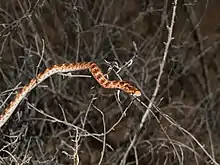| Lytorhynchus diadema | |
|---|---|
 | |
| Scientific classification | |
| Domain: | Eukaryota |
| Kingdom: | Animalia |
| Phylum: | Chordata |
| Class: | Reptilia |
| Order: | Squamata |
| Suborder: | Serpentes |
| Family: | Colubridae |
| Genus: | Lytorhynchus |
| Species: | L. diadema |
| Binomial name | |
| Lytorhynchus diadema | |
Lytorhynchus diadema, the crowned leafnose snake, diademed sand snake, or awl-headed snake, is a non-venomous snake[2] found in Middle East, North Africa & West Asia.
Description
Lytorhynchus diadema adults range from 30-51 cm in length.
Pale buff or cream color above, with a series of 13 – 18 large transversely rhomboidal dark spots; a dark median band along the head and nape, sometimes confluent with an interocular transverse band; an oblique dark band from the eye to the angle of the mouth; lower parts uniform white.[3]
Distribution
Algeria, Egypt, Iran, Iraq, Israel, Jordan, Kuwait, Libya, Morocco, Niger, Oman, Saudi Arabia, Tunisia, United Arab Emirates, Yemen, Mauritania, West Sahara.[2]
This species is found in sandy desert, semi-desert, sandy coastal areas, areas of high grassland plateaus (especially those close to rocky areas), and clay plateaus with rocks. This species digs, but is not considered fossorial In Arabia it appears to occur in a wide range of dry habitats.[4]
Diet
It feeds mainly on lizards but will eat large arthropods, insects and young rodents.
Reproduction
The species is oviparous, laying clutches of three to five eggs.
References
- ↑ Amr, Z.S.S.; Els, J.; Al Johany, A.M.H.; Soorae, P.; Nilson, G.; Shafiei Bafti, S.; Anderson, S.; Böhme, W.; Joger, U.; Geniez, P.; Mateo, J.A.; Disi, A.M.; Baha El Din, S.; Papenfuss, T.; Sharifi, M.; Wilms, T.; Wagner, P. (2013). "Lytorhynchus diadema". IUCN Red List of Threatened Species. 2013: e.T164769A1074038. doi:10.2305/IUCN.UK.2013-1.RLTS.T164769A1074038.en. Retrieved 27 February 2022.
- 1 2 "WCH Clinical Toxinology Resources". www.toxinology.com. Retrieved 2019-01-23.
- ↑ AMR, ZUHAIR; DISI, AHMAD (2011). Systematics, distribution and ecology of the snakes of Jordan. www.vertebrate-zoology.de. p. 211.
- ↑ "The IUCN Red List of Threatened Species". IUCN Red List of Threatened Species. Retrieved 2019-01-23.
